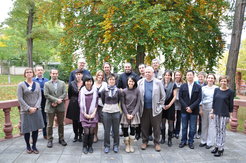World Heritage as Focus of Anthropological Research
An international workshop on "World Heritage on the Ground: ethnographic perspectives" focused on fieldwork-centered questions of UNESCO World Heritage
On 11-12 October, David Berliner (Université libre de Bruxelles) and Christoph Brumann (MPI for Social Anthropology) organised the international workshop "World Heritage on the Ground: ethnographic perspectives" at the Max Planck Institute. In the first ever such meeting, thirteen anthropologists with long-term field experience at places inscribed on the UNESCO World Heritage List presented papers on the local consequences of that increasingly prominent global institution.
Discussants Ulf Hannerz, Brigitta Hauser-Schäublin, and Michael Rowlands greatly helped with teasing out the commonalities and parallel developments. The case studies ranged from Chichén Itzá (Mexico) to Borobudur (Indonesia), with African and Asian sites predominating, and included cities, archaeological sites, and cultural landscapes. Recurring topics were the important role of national rather than transnational actors and institutions and the consequences for resident populations that reach all the way from new economic opportunities and empowerment to silencing and eviction. The huge hiatus between the World Heritage decision-making machinery and the social reality of the sites was also addressed. An edited volume with the contributions is in preparation.

